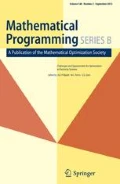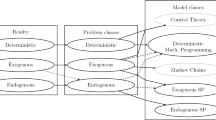Abstract
The paper surveys the basic results and nonresults for decision rules in stochastic programming. It exhibits some of the difficulties encountered when trying to restrict the class of acceptable rules to those possessing specific functional forms. A liberal dosage of examples is provided which illustrate various cases. The treatment is unified by making use of the equivalence of various formulations which have appeared in the literature. An appendix is devoted to the P-model for stochastic programs with chance constraints.
Similar content being viewed by others
References
D. Blackwell and N.S. Girshick,Theory of games and statistical decisions (Wiley, New York, 1954).
A. Charnes and W.W. Cooper, “Chance-constrained programming”,Management Science 6 (1959) 73–79.
A. Charnes and W.W. Cooper, “Deterministic equivalents for optimizing and satisficing under chance constraints”,Operations Research 11 (1963) 18–39.
A. Charnes and W.W. Cooper, “Chance-constraints and normal deviates”,Journal of the American Statistical Association 52 (1962) 134–148.
A. Charnes, W.W. Cooper and M.J.L. Kirby, “Optimal decision rules in conditional probabilistic programming”,Atti della Accademia Nazionale dei Lincei, Memorie, Classe di Scienze Fisiche, Mathematiche e Naturali, Sezione VIII 45 (1968) 231–235.
A. Charnes, W.W. Cooper and G. Symonds, “Cost horizons and certainty equivalents: An approach to stochastic programming of heating oil production”,Management Science 4 (1958) 235–263.
A. Charnes and M.J.L. Kirby, “Optimal decision rules for the E-model of chance-constrained programming”,Cahiers du Centre d'Etudes de Recherche Operationelle 8 (1966) 5–44.
A. Charnes and M.J.L. Kirby, “Optimal decision rules for the triangular E-model of chance-constrained programming”,Cahiers du Centre d'Etudes de Recherche Operationnelle 12 (1969) 215–243.
A. Charnes and M.J.L. Kirby, “Some special P-models in chance-constrained programming”,Management Science 14 (1967) 183–195.
M.J. Eisner, “On duality in infinite-player games and sequential chance-constrained programming”, Ph.D. Dissertation, Cornell University, Ithaca, N.Y. (1970).
M.J. Eisner, R.S. Kaplan and J.V. Soden, “Admissible decision rules for the E-model of chance-constrained programming”,Management Science 17 (1971) 337–353.
R. Kaplan and J. Soden, “On the objective function for the sequential P-model of chance-constrained programming”,Operations Research 19 (1971) 105–114.
K.O. Kortanek and J.V. Soden, “On the Charnes—Kirby optimality theorem for the conditional chance-constrained E-model”,Cahiers du Centre d'Etudes de Recherche Operationnelle 8 (1967) 78–98.
M. Lane, “A conditional chance constrained model for reservoir control”, Manuscript, London School of Economics (1972).
D. Walkup and R.J.-B. Wets, “Stochastic programs with recourse”,SIAM Journal on Applied Mathematics 15 (1967) 1299–1314.
D. Walkup and R.J.-B. Wets, “Stochastic programs with recourse: Special forms”, in:Proceedings of the Princeton symposium on mathematical programming, Ed. H.W. Kuhn (1970) pp. 139–161.
D. Walkup and R.J.-B. Wets, “A note on decision rules for stochastic programs”,Journal of Computer and System Sciences 2 (1968) 305–311.
D. Walkup and R.J.-B. Wets, “Lifting projections of convex polyhedra”,Pacific Journal of Mathematics 28 (1969) 465–475.
R.J.-B. Wets, “Characterization theorems for stochastic programs with recourse”,Mathematical Programming 2 (1972) 166–175.
W. Ziemba, “Transforming stochastic dynamic programming problems into nonlinear programs”,Management Science 17 (1971) 450–462.
Author information
Authors and Affiliations
Rights and permissions
About this article
Cite this article
Garstka, S.J., Wets, R.J.B. On decision rules in stochastic programming. Mathematical Programming 7, 117–143 (1974). https://doi.org/10.1007/BF01585511
Received:
Revised:
Issue Date:
DOI: https://doi.org/10.1007/BF01585511




